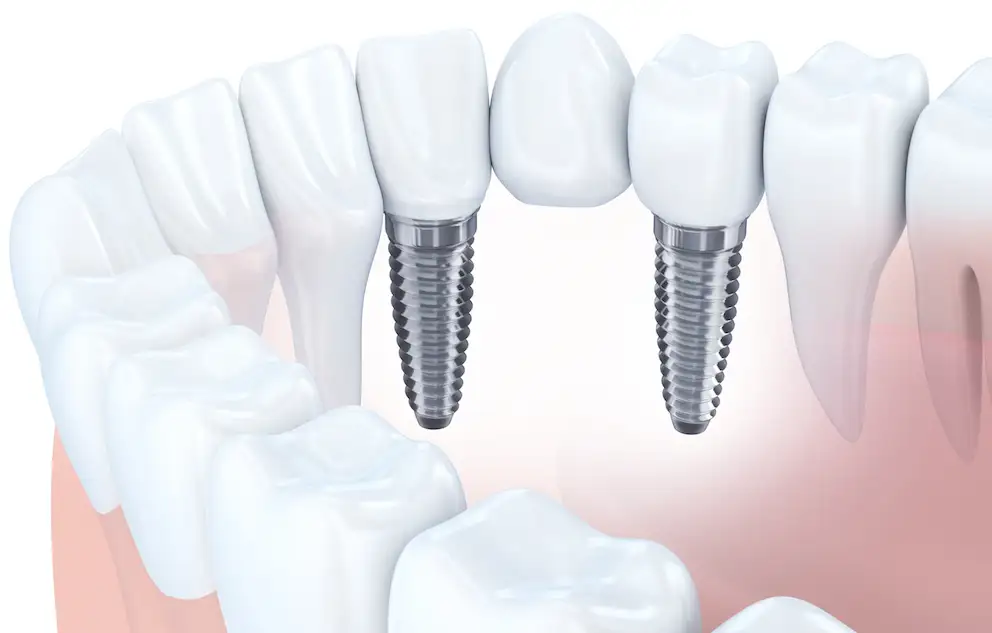Did you know that there are close to 180 million American adults that are missing at least one tooth and 40 million are missing all of their teeth? If you are among the population that is missing two or more teeth in Arlington, Virginia, visit Arlington Dental Excellence to find out if an implant-supported bridge is an appropriate treatment for you. Dr. Alan Jureidini is our periodontist/implantologist. He has the knowledge and experience to advise you on your best options for tooth restoration.
Implant-supported bridges are a lot like traditional dental bridges, in that it replaces several missing teeth in a row. The difference is it is supported by dental implants instead of your natural teeth. The implants provide unmatched support and stability for tooth restorations and keep you jawbone healthy and strong after tooth loss.



While implant-supported bridges are a great option for tooth replacement, not everyone is a good candidate for this treatment. Some of the things that make a patient a good candidate for implant-supported bridges include:
In order to determine if an implant-supported bridge is right for you, schedule a consultation with Dr. Alan Jureidini and the staff at Arlington Dental Excellence today.

Traditional dental bridges have been used for decades. They are a dental appliance made from a solid block of ceramic or other high-quality dental material. There is a crown on either side and the artificial teeth sit between them. Before placing the bridge, a dentist will need to file down the natural teeth on either side so the bridge fits properly.
This is an ideal option for patients who want a quick replacement. In most cases, it can be done in about a week. Traditional bridges are often the first choice for patients who are not good candidates for oral surgery.
Though they can be placed quickly, it's important to understand that a traditional bridge only lasts for about 15 years. Also, since the natural teeth are filed down to accommodate the crowns, they are more vulnerable to future damage.

When it comes to function, an implant-supported bridge is basically the same as a traditional bridge. However, instead of being anchored to your natural teeth, they are anchored to dental implants. The implants replace the roots of missing teeth and are inserted into the jawbone during oral surgery.
Since implant-supported bridges are not supported by your natural teeth, no filing is required, so healthy natural teeth are left intact. Since dental implants stimulate the jawbone like natural teeth roots, they preserve bone density and volume. Therefore, patients don't experience bone atrophy, which is common with tooth loss. Plus, with proper care, dental implants can last a lifetime. This means that implant-supported bridges are among the longest lasting tooth restorations available.
Since implant-supported bridges require implants, oral surgery is required. Since surgery is required, the healing time is a bit longer. The implants require 3 to 6 months to heal before the bridge is attached. However, you will be provided with a temporary restoration so that you don't have to live with a gap for that long.
Dr. Jureidini has the knowledge and experience with both traditional and implant-supported bridges. Schedule your consultation today at Arlington Dental Excellence to learn more about your options.
If you are in or near Arlington, Virginia, come visit Dr. Jureidini and the team at Arlington Dental Excellence. We would love to explain your options for tooth restoration, including implant-supported bridges. We also offer other dentistry procedures as well, including general dentistry and cosmetic dentistry procedures. Schedule your free consultation today.
We find that many of our patients have questions and concerns about implant-supported bridges. If you do, please feel free to bring them up during your consultation with Dr. Jureidini and the team. We will be happy to answer questions and ease concerns. Here are some of the most common questions we get:
A: An implant supported bridge requires the placement of titanium screws into the jawbone for on each side of the bridge instead of shaving down the natural teeth for crowns. This is one of the strongest and most restorative tooth replacement treatment available.
A: Typically, a dental bridge replaces 1 to 4 teeth- it depends on the patient's needs. Most often, it will replace 1 to 2 teeth.
A: The implants themselves will likely last a lifetime with proper care- but the bridge may need to be replaced at some point. Most of the time, it will last at least 20 years before needing to be replaced.
A: If you are missing 1 or more teeth in a row, a bridge with the same number of artificial teeth can be secured to 1 or more implant posts, which helps you avoid altering the structure of your healthy natural teeth to support crowns for the bridge to attach to.
A: An implant-supported crown is a restorative dental procedure that is made up of an implant and a crown. The implant extends below the gum and into the jawbone, acting as the root. The crown is placed on top of the implant, above the gum, closing the gap in your smile.
A: An implant-supported denture is a dental appliance that replaces several teeth. if you've lost most of your teeth, we may recommend implant-supported dentures. This tooth restoration method uses at least 2 implants for support. However, we may recommend the All-on-4 or All-on-6 for best results.


